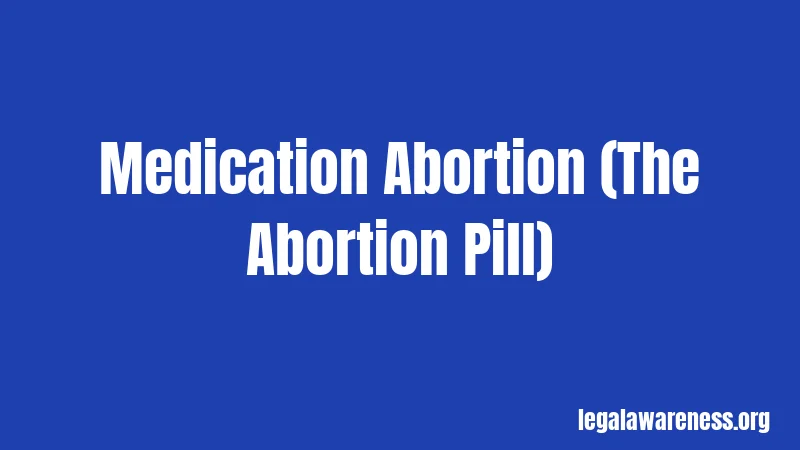Abortion Laws in Georgia (2026): The 6-Week Ban Explained
Most people don’t realize how strict Georgia’s abortion laws are. Seriously. The rules here are some of the toughest in the country. If you live in Georgia or know someone who does, this is important information.
Georgia currently enforces what’s called a “heartbeat ban.” This means abortion is banned once cardiac activity can be detected. That’s usually around six weeks into a pregnancy. And here’s the thing: most people don’t even know they’re pregnant at six weeks.
Let me break down exactly what you need to know about Georgia’s abortion laws, the exceptions, the penalties, and your options.
What Is Georgia’s Abortion Ban?

Georgia’s abortion restrictions come from a law called the Living Infants Fairness and Equality (LIFE) Act. Governor Brian Kemp signed this law in 2019. But it didn’t take effect until July 2022. That’s when the U.S. Supreme Court overturned Roe v. Wade.
The law bans abortion after a “detectable human heartbeat.” Georgia defines this as “the steady and repetitive rhythmic contraction of the heart within the gestational sac.” This typically happens around six weeks from your last menstrual period. Many medical experts point out that what’s detected isn’t actually a heartbeat from a formed heart. It’s electrical activity from cells that will eventually become a heart.
Here’s where it gets confusing. Pregnancy is counted from your last period, not from conception. So six weeks pregnant really means you’re about two weeks late for your period. That’s an incredibly short window.
Sound complicated? It’s actually pretty straightforward once you understand the timing. But the short deadline makes it extremely difficult for many people to get care in time.
Exceptions to the Six-Week Ban
Okay, pause. This part is important.
Georgia does allow some exceptions to the six-week ban. But they’re narrow. You can still get an abortion after six weeks in these situations:
A doctor determines there’s a medical emergency. This means the pregnancy could cause death or serious permanent harm to the mother. The law is clear that doctors should use their reasonable medical judgment. The state has said death doesn’t need to be imminent for doctors to act.
The pregnancy resulted from rape or incest. But there’s a catch. An official police report must be filed. And this exception only applies up to 20 weeks of pregnancy.
The pregnancy is “medically futile.” This means a doctor has determined the fetus won’t survive outside the womb.
These exceptions exist, but they’re not always simple to use. Doctors have expressed confusion about when exactly they can legally intervene. This has led to tragic outcomes in some cases.
What Happens Before Six Weeks?

If you’re within the legal window, you can get an abortion in Georgia. But there are still requirements you must follow.
Georgia requires a 24-hour waiting period. This means you’ll need at least two contacts with a provider. First, you receive state-mandated counseling. Then you wait 24 hours. Only after that waiting period can you have the abortion.
During the counseling, the provider must tell you about the medical risks of the procedure. They’ll share the probable gestational age of the pregnancy. If cardiac activity is detected, they’ll let you know. They also have to inform you about alternatives like adoption.
An ultrasound must be performed before any abortion. If cardiac activity is detected, the abortion cannot proceed unless an exception applies. You have the right to view the ultrasound and hear any detected activity, but you’re not required to.
Pretty straightforward, right? The main challenge is the tight timeline combined with the waiting period.
Who Can Perform Abortions?
Only licensed physicians can perform abortions in Georgia. That’s an important distinction. Nurse practitioners and physician assistants cannot provide abortion care. This limits the number of providers available.
As of late 2025, there are about 13 abortion clinics in Georgia. Most are located in the Atlanta area. If you live in rural Georgia, getting to a clinic can be a significant challenge.
The procedure must happen in a licensed medical facility. Home abortions without medical supervision are not permitted under Georgia law.
Medication Abortion (The Abortion Pill)

Here’s the deal. Medication abortion is legal in Georgia under the same restrictions as surgical abortion. You can get abortion pills if you’re within the six-week window and no cardiac activity has been detected.
The abortion pill is actually two medications: mifepristone and misoprostol. These work together to end an early pregnancy. The FDA has approved their use up to 10 weeks of pregnancy, but Georgia’s law limits this to the six-week window.
Wondering if you can get pills through telehealth? Georgia allows telehealth consultations, but you still need an ultrasound first. A Georgia provider cannot prescribe abortion pills without confirming there’s no detectable cardiac activity. Some people order pills from out-of-state telehealth providers, but this exists in a legal gray area.
Self-managed abortion isn’t technically a crime in Georgia. However, the law is murky. And if something goes wrong and you need medical care, there can be complications.
Penalties and Consequences
Now, here’s where things get serious.
Doctors who perform illegal abortions in Georgia face felony charges. A conviction means one to ten years in prison. That’s not a minor penalty. This is why many doctors are extremely cautious about providing care, even in emergency situations.
Other violations carry different penalties. Failing to follow reporting requirements is a misdemeanor. That can mean up to 12 months in jail and fines up to $1,000. Improper handling of fetal remains can result in fines up to $5,000.
Beyond criminal charges, doctors risk losing their medical licenses. The Georgia Composite Medical Board can take disciplinary action for any violations.
What about the pregnant person? Georgia law currently protects women from criminal prosecution for getting an abortion. However, you can file a civil lawsuit against a provider who performed an illegal abortion on you.
Honestly, this is the part most people miss. The penalties target providers, not patients. But the chilling effect on doctors has made care harder to access even in legal situations.
Minors and Parental Notification
If you’re under 18 and not legally emancipated, Georgia has additional requirements. Your parent or guardian must be notified at least 24 hours before any abortion. This is called parental notification.
Important: your parent does not have to consent or agree. They just have to be notified.
If you can’t or don’t want to involve your parents, there’s another option. It’s called a judicial bypass. You petition a juvenile court to allow you to make this decision on your own. The court must schedule your hearing within three days. After the hearing, the judge typically decides immediately.
You’re entitled to a free lawyer during the judicial bypass process. Organizations like the Repro Legal Helpline can help connect minors with attorneys who understand the process.
You’re not alone. Many young people use judicial bypass successfully every year.
Insurance and Paying for Care
Let’s talk about money. Because this can be a real barrier.
Georgia Medicaid does not cover abortions except in very limited cases. Those exceptions are rape, incest, or when the mother’s life is in danger. These are the same limits set by the federal Hyde Amendment.
Private insurance may cover abortion, depending on your plan. But Georgia requires you to purchase a separate rider for abortion coverage. It’s not included automatically. Marketplace plans under the Affordable Care Act only cover abortion in medical emergencies.
State employees are also limited. Their insurance only covers abortion when the mother’s life is at risk.
The cost of an abortion in Georgia varies. Medication abortion typically costs between $300 and $600. Surgical procedures can range from $500 to over $1,000. These prices don’t include potential travel, lodging, or childcare costs.
Several abortion funds operate in Georgia and can help with costs. Organizations like Access Reproductive Care-Southeast provide financial and practical support for people seeking care.
Ongoing Legal Challenges
The law keeps changing. That’s worth knowing.
In September 2024, a Georgia trial court struck down the six-week ban. Judge Robert McBurney ruled it violated the Georgia Constitution’s privacy protections. For one week, abortions were legal up to 22 weeks in Georgia.
But the Georgia Supreme Court quickly reinstated the ban while considering an appeal. As of late 2025, the six-week ban remains in effect. The case was sent back to the trial court on a legal technicality about who has standing to sue.
This means the law could change again. If you’re seeking care, always check the most current status with a provider or legal organization.
Preventable Tragedies
I want to mention something difficult but important. Georgia’s abortion ban has been linked to preventable deaths.
In 2022, two Georgia women died after complications from pregnancy. A state maternal mortality review committee found both deaths were preventable. The women couldn’t access timely care due to confusion and fear around the abortion ban.
These cases received national attention. They highlighted how strict abortion bans can affect even wanted pregnancies when medical emergencies arise.
Doctors have described feeling paralyzed by the threat of prosecution. Even when exceptions exist, the risk of criminal charges makes some providers hesitant to act quickly.
Your Options
So what can you do if you need abortion care in Georgia?
If you’re early in pregnancy, seek care immediately. Time is critical under the six-week law. Contact a clinic as soon as you suspect you might be pregnant.
If you’re past six weeks, you may need to travel. North Carolina currently allows abortion up to 12 weeks. Virginia and Illinois are also options for Georgia residents.
Several organizations can help. Abortionfinder.org and ineedana.com can connect you with providers. Abortion funds can assist with costs and travel logistics.
If you’re having a medical emergency related to pregnancy, go to the emergency room. Federal law still requires hospitals to provide stabilizing care, including abortion if medically necessary.
Frequently Asked Questions
Is abortion completely illegal in Georgia? No, abortion is legal before cardiac activity is detected, usually around six weeks. Exceptions exist for medical emergencies, rape, incest, and medically futile pregnancies.
Can I get the abortion pill in Georgia? Yes, if you’re within the legal window and no cardiac activity has been detected. You’ll still need an ultrasound and must follow the 24-hour waiting period.
Will I go to jail for having an abortion in Georgia? Georgia law currently protects patients from criminal prosecution. The penalties target providers, not patients seeking care.
What if I’m under 18? Your parent must be notified 24 hours before the abortion. If you can’t involve a parent, you can request a judicial bypass from a court.
Does insurance cover abortion in Georgia? Most insurance plans don’t automatically cover abortion. Medicaid only covers cases of rape, incest, or life endangerment. Private plans may require a separate rider.
Final Thoughts
Georgia’s abortion laws are strict and constantly evolving. The six-week ban creates an extremely narrow window for care. But options still exist, both within the state and through travel.
If you’re facing a decision about pregnancy, reach out to trusted resources quickly. Time matters. And remember, legal organizations and abortion funds exist specifically to help people navigate these restrictions.
Stay informed. And when in doubt, talk to a lawyer or a medical provider who specializes in reproductive care.
References
- Georgia Code § 16-12-141 (2024) – Restrictions on the Performance of Abortions: https://law.justia.com/codes/georgia/title-16/chapter-12/article-5/section-16-12-141/
- Georgia Department of Public Health – Woman’s Right to Know: https://dph.georgia.gov/womens-right-know-wrtk
- Center for Reproductive Rights – SisterSong v. State of Georgia: https://reproductiverights.org/case/post-roe-state-abortion-ban-litigation/sistersong-v-state-georgia/
- Guttmacher Institute – Georgia Abortion Policies: https://states.guttmacher.org/policies/georgia/abortion-policies
- Georgia Code § 15-11-682 – Parental Notification of Abortion: https://law.justia.com/codes/georgia/title-15/chapter-11/article-8/section-15-11-682/
